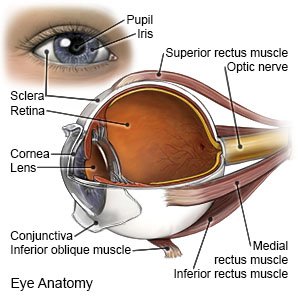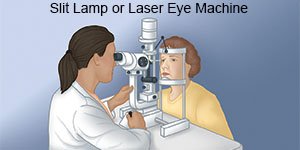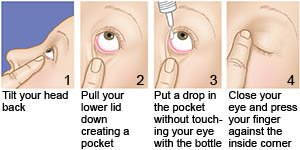Uveitis
Medically reviewed by Drugs.com. Last updated on Aug 4, 2025.
What is uveitis?
Uveitis is inflammation inside one or both eyes. The inflammation damages parts of the eye. Uveitis usually damages the uvea (a thin layer inside the outer wall of the eye), but any part of your eye may be damaged. Treatment is needed to prevent serious damage and loss of vision.
 |
What causes or increases my risk for uveitis?
The cause of your uveitis may not be known. Any of the following may increase your risk:
- An inflammatory or autoimmune disease, such as rheumatoid arthritis, lupus, or multiple sclerosis (MS)
- An eye injury or eye infection
- A general infection, such as herpes or tuberculosis (TB)
- A weakened immune system, such as from an HIV infection
What are the signs and symptoms of uveitis?
You may have any of the following, depending on the part of your eye that is affected:
- Pain that may be deep in your eye or on the surface
- Sensitivity to light, or pain in the affected eye when light shines in the other eye
- Floaters or heavy tearing
- Eye redness
- Vision problems, blurred vision, or loss of vision
How is uveitis diagnosed?
Your healthcare provider will ask about your symptoms and when they started. Tell your provider if you have any medical conditions or take any medicines. You may also need any of the following:
- An eye exam may help your provider find the cause of your uveitis. You will be asked to look in different directions. You may also be asked to read letters off a chart on the wall. Your provider may gently press on your eye or eyelid to check for drainage. The pressure in each eye will also be checked.
- A slit-lamp exam helps your provider have a better view of the inside of your eye. Your provider will shine a bright light in your eye to check for inflammation. You may need eye drops to dilate (widen) your pupils. This allows your provider to check your whole eye for uveitis or other eye problems.

- Blood tests may be used to check for an infection or medical condition causing your symptoms.
How is uveitis treated?
Treatment depends on the cause of your uveitis:
- Steroid eye drops help decrease pain and inflammation. These are only used for a short time to relieve the inflammation. The way steroids are given will depend on which part of your eye is affected. You may be given pills if the cause of your uveitis is not an infection. Steroids may also be given as injections into the area around your eye.
- Cycloplegic eye drops dilate your pupil and relax your eye muscles. This helps decrease pain and light sensitivity.
- Surgery may be used to place an implant into your eye. The implant gives small amounts of steroid medicine over time. Surgery may also be used to treat complications of uveitis.
- Other treatment may be needed to treat a disease or condition causing your uveitis. For example, antibiotics may be needed to treat a bacterial infection.
Treatment options
The following list of medications are related to or used in the treatment of this condition.
What can I do to manage uveitis?
- Get an eye exam every 1 to 2 years, or as directed. Early diagnosis and treatment of eye problems may prevent permanent damage.
- Apply a warm compress to your eye. Wet a washcloth in warm water and wring it out. Place it gently over your eye for 20 minutes 3 to 4 times each day. This will help soothe your eye.
- Wear dark sunglasses. This will help prevent pain and light sensitivity. Make sure the sunglasses have UVA and UVB protection. This will protect your eyes when you go outside.
- Use eye drops safely. If your treatment plan includes eye drops, it is important to use them as directed. Your provider may give you detailed instructions to follow. The eye drops may also come with safety instructions. Follow all instructions to help prevent an infection. Do not touch the tip of the bottle to your eye. Germs from your eye can spread to the medicine bottle.

When should I seek immediate care?
- You suddenly lose your vision.
- Your pain gets worse, even after treatment.
- Your vision suddenly gets worse.
- You have severe eye pain.
When should I call my doctor or ophthalmologist?
- You have questions or concerns about your condition or care.
Care Agreement
You have the right to help plan your care. Learn about your health condition and how it may be treated. Discuss treatment options with your healthcare providers to decide what care you want to receive. You always have the right to refuse treatment. The above information is an educational aid only. It is not intended as medical advice for individual conditions or treatments. Talk to your doctor, nurse or pharmacist before following any medical regimen to see if it is safe and effective for you.© Copyright Merative 2025 Information is for End User's use only and may not be sold, redistributed or otherwise used for commercial purposes.
Further information
Always consult your healthcare provider to ensure the information displayed on this page applies to your personal circumstances.
